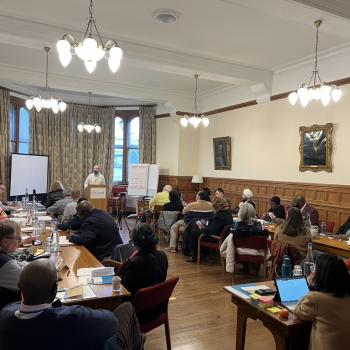Editors' Note: This article is part of the Patheos Public Square on Moving Past Hatred. Read other perspectives here.
The reality of hate is ancient, but a world amid a communications revolution has yielded ways of expressing negative opinions or conversely shaming those who can be deemed "haters." While we will always have those who don't care about the opinions of others, we are in a time when many Christians are leery of expressing strong opinions, or at least in mixed company for fear of receiving the metaphorical brand with an "H."
Among the multiple topics that can be discussed regarding hate, the question of how to be a person of strong convictions (especially on matters such as sexuality) while creating a kind of Teflon veneer that resists the attachment of the "Hater" label is a significant challenge. It is interesting and sometimes lamentable to observe that various forms of media have facilitated the ability to have shouting matches between ideological opponents along with echo chamber environments that impede the possibility of encountering diverse voices on contentious topics. The gift of communication technologies is often a potent force liable to misuse.
Nevertheless, I believe there is a better way available besides limiting one's fellowship to silos inhabited by the like-minded. Instead, a serious embrace and practice of a familiar dimension of the Christian mission can provide a path for us: truly regarding all other human beings as our neighbors. This is not as easy as it sounds (imagine attempting this in Syria), and in some cases may seem as unlikely as having a Samaritan as the hero and neighbor in one of Jesus' most well-known parables (Luke 10:30-37). Some people are truly in settings where antagonism and conflict is strong.
In circumstances like this, the command to love our neighbors as ourselves will be put to the test. What are we to do?
Though perhaps obvious, one of the most important ways to love our neighbors is to be committed to telling the truth about them. Sometimes this means acknowledging that those with whom we disagree may have legitimate concerns or real experiences of great harm. Several years ago I read an editorial by LGBT rights activist Larry Kramer where he stated "everybody hates us" (referring to the LGBT population). Having seen Kramer on television, I knew he was an incendiary figure at times so I took his words to be the pinnacle of hyperbole, especially as this was amid the changing tide of opinion about sexuality in the U.S. Yet Kramer is not the only LGBT person with such sentiments, though perhaps stated less strongly. In the ongoing ferment about issues of sexuality, it seems that among the seldom-asked questions are "what if people have had horrific experiences and genuinely live in fear?"
To acknowledge that people may have had experiences that lead them to agree with Kramer is not to necessarily agree with their cultural and political aspirations but to give someone the same consideration we would desire for ourselves; I doubt that anyone wants others to disregard their perspective and experiences. To take a moment (or several) to consider the experience of others, especially those with whom we have intense disagreements, is to live out a key element of Christian mission.
Someone may ask, where is the place for a prophetic voice when we believe our convictions are true? As followers of Christ, our commitment to truth does not release us from the obligation to be careful in our communication. Strong statements can be made while considering how we would desire to receive words of deep conviction.
We do no one a service if stick our heads in the sand and mute the expression of deeply held convictions. Pausing before we speak, carefully considering our words, and acknowledging the truth about others can help us resist the vortex of hate that likely tempts some of us when the storm of disagreement threatens to become violent.
10/13/2015 4:00:00 AM




